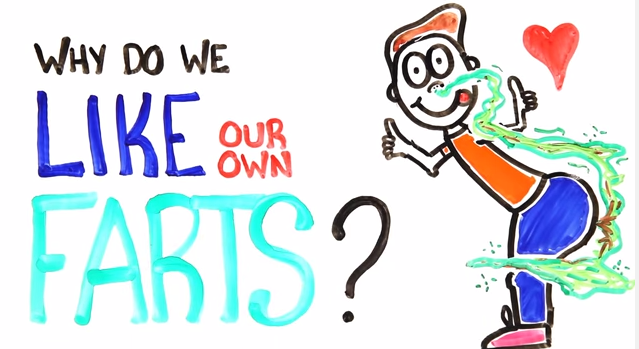Our Favorite Fart Smells Are Protecting Our Bodies From Possible Disease

Passing gas, farts, toots, flatus, intestinal gas, or whatever you prefer to call it, are a natural part of your digestive process. When you eat, you don’t just swallow food but you also swallow air, which contains nitrogen and oxygen. These small bubbles of gas, according to Chemist Anne Marie Helmenstine, make their way through your body and mix with hydrogen, carbon dioxide, and methane along the way. The only way they can escape the body is by releasing out of your rear end (tush, behind, you get where we're going with this) and into the air we breathe.
Grossed out yet? The human race releases 70 billion farts every single day, about 10 of which you have to own up to. But why don’t our farts bother us as much as the rest of the worlds? The guys at AsapSCIENCE produce a video each week that aims to answer all different types of “quirky and mind-blowing science” questions, and they’ve dedicated one entirely to farts.
Turns out, the millions of gut bacteria that reside within your body match the ones that are released when you pass gas. In blind smell tests, people preferred their farts over every one else’s every time (wouldn’t want to be a participant in that study!). The bottom line: we prefer what’s familiar to us.
But it might go deeper than that. Things that don’t smell pleasant are usually poisonous, bacteria-ridden, or expired (if we're talking about food). We instinctively avoid another person's farts in order to protect ourselves from possible harm. Unhygienic things, animals, or people can carry disease; some can be transmitted through air-borne fecal matter contained in a fart. Mothers, however, are an exception to that rule. The smell of their own baby or child doesn’t offend them as much, making it easier to clean them and maintain their hygiene.
A good ol’ SBD (silent but deadly) fart is one of the worst because it doesn’t give the brain time to prepare itself for the smell. The anterior cingulate cortex is the part of the brain that processes your body’s own fart or the sound of another’s. It warns the rest of the brain the foul smell that is to follow.
Published by Medicaldaily.com



























